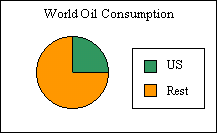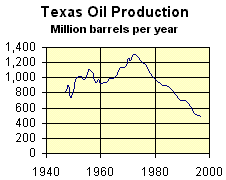

 |
U.S.A. |
|---|---|
 | |
|
Peak Oil and the National Petroleum Council Report, Congressman Roscoe Bartlett, in the Congressional Record, House of Representatives [2007 July 19] "Then there are the people who believe, and I also think they are probably more right than wrong. By the way, even if I thought they were wrong, I would want to lock arms with them because what they want to do is exactly what I want to do for the other two reasons, and these are the people who believe that our large use of fossil fuels releasing this carbon that has been sequestered now for a very long time, releasing it very quickly is producing global warming and climate change, and what they want to do is use less fossil fuels and more of something else; and I believe that that may be true. And whether it is true or not, I say I am going to lock arms with them. And, thank you, Al Gore, for leading this charge. I want to lock arms with them because what they want to do to solve that problem, even if it doesn't turn out to be a problem, is exactly the thing we need to do to solve the national security dilemma and to solve the dilemma of peak oil, because we have got to find something to replace these fossil fuels because obviously they cannot last forever."
"Those who use dollars outside the US continuously pay a contribution to the US. It comes in the form of an inflation of 1.25 million dollars per minute. This is the result of the fast increase of the US foreign debt. Half of all US’ imports are simply added to the foreign debt and paid for by the foreign dollar holders through inflation. 
New GAO Peak Oil Report Provides Urgent Call to Action: U.S. Vulnerable and the Government Unprepared for Unacceptably High Risks of Oil Supply Shock, by Congressmen Roscoe Bartlett (R-MD) and Tom Udall (D-NM), co-chairmen of the Congressional Peak Oil Caucus [2007 March 29] "This GAO peak oil report is a clarion call for leadership at the highest level of our country to avert an energy crisis unlike any the world has ever before experienced and one that we know could happen at any time. Only the President can rally the country to take the urgent steps necessary. Potential alternatives to oil are extremely limited. Technology won't save us without time and money to develop and scale them up."GAO Peak Oil Report (Complete), Highlights
Executive Order: Strengthening Federal Environmental, Energy, and Transportation Management [as pdf with signature] [at GSA] [2007 January 24]
National Security Consequences of Oil Dependency. The Council on Foreign Relations woke up! ... with help from its Independent Task Force, John Deutch and James R. Schlesinger, Chairs [2006 October] Three New Bold Ideas for Energy Independence and Global Climate Change, by John Kerry [2006 June 26] "Today, in a speech at Faneuil Hall in Boston, Massachusetts, John Kerry introduced a bold new plan to achieve energy independence and combat global climate change. Kerry's plan challenges America to accept three big ideas to win energy independence and meet the ten year challenge of combating global climate change."Global Warming: A Sputnik Moment? Listen to Governor Brian Schweitzer on Open Source [2006 May 31] Energy Tax Policy, by Salvatore Lazzari, Resources, Science, and Industry Division, Congressional Research Service ˜ The Library of Congress [Updated 2006 May 25] Clean and Diversified Energy Initiative, by Western Governors' Association Solar Task Force [2006 January] "At their Annual Meeting in June, 2006, Western Governors will consider and adopt a broad range of recommendations for increasing the development of clean and diverse energy, improving the efficient use of energy and ensuring adequate transmission." State of the Union: The Advanced Energy Initiative [2006 January 31] In his State of the Union Address, President Bush outlined the Advanced Energy Initiative to help break America's dependence on foreign sources of energy. Energy Trends and Their Implications for U.S. Army Installations Donald F. Fournier and Eileen T. Westervelt [2005 September] "The United States currently has 5 percent of the world’s population, but uses 25 percent of the world’s annual energy production. This disproportionate consumption of energy relative to global consumption causes loss of the world’s good will and provides a context for potential military conflicts, at the cost of lives, money, and political capital. A more equitable distribution of resources is in our best interest for a peaceful future." Biomass as Feedstock for a Bioenergy and Bioproducts Industry: The Technical Feasibility of a Billion-Ton Annual Supply Robert D. Perlack et al, a joint study sponsored by U.S. Department of Energy and U.S. Department of Agriculture [2005 April] Finally some one speaks out about Peak Oil in the US Congress: Oil Demands in the House of Representatives, by Congressman Roscoe Bartlett [Printer friendly version] [2005 March 14] "Mr. BARTLETT of Maryland. Mr. Speaker, in this first chart we have some headlines from The Washington Post just a month or so ago. These are headlines from just one day in The Washington Post. The Dow drops 174 points driven, the article says, by economic damage from rising oil prices, the plunging dollar, and growing worries about consumer spending. It goes on to say that a recent oil price rise of 20 percent is continuing to crunch the profits of struggling airlines and is believed to be a factor in disappointing retail sales. US Mayors Climate Protection Agreement, by Seattle Mayor Greg Nickels [2005 February 16] "On February 16, 2005 the Kyoto Protocol, the international agreement to address climate disruption, became law for the 141 countries that have ratified it to date. On that day, Seattle Mayor Greg Nickels launched this initiative to advance the goals of the Kyoto Protocol through leadership and action by at least 141 American cities."
Back to our comment about Arkansas, let's compare Energy Consumption per Capita by State and then Total Production and Production per Well by State and then some other details of certain states.
from Eric Niiler, Scientific American: Science and The Citizen: Awash in Oil September 2000 This demonstrates that there is substantial confusion even in the scientific community regarding the difference between reserves and resources. As stated by USGS Public Affairs Specialist, Carolyn Bell:  Joining the chorus of relabeling optimism as science, Richard Kerr wrote for Science Magazine: Joining the chorus of relabeling optimism as science, Richard Kerr wrote for Science Magazine:
from "USGS Optimistic on World Oil Prospects" pg 237 of Vol 289, 14 July 2000. The "scientific" debate continues.
|
||||||||||||||||||||||||||||||||||||||||||||||||||||||||||||||||||||||||||||||||||||||||||||||||||||||||||||||||||||||||||||||
 |
|
 © 1994-2011 • Ecotopia © 1994-2011 • Ecotopia |
• contact info |